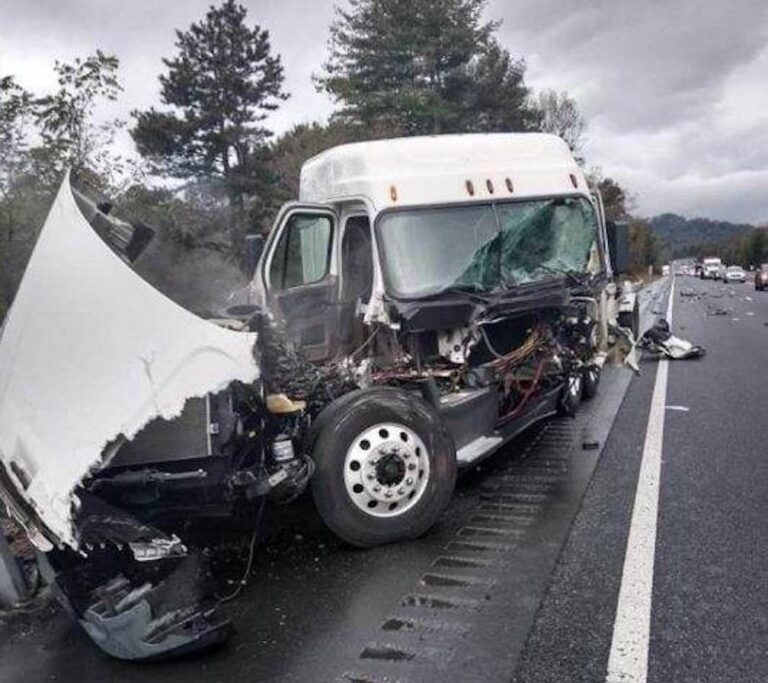The thought that any mile you drive could be your last is sobering — but it’s a reality for anyone who earns a living at the wheel of a truck.
For most of us, that last mile is likely to be far in the future.
For Lanny Weaver, it became a painful reality one day in July 2016. On that fateful day, Weaver suffered a stroke while driving through Greenville County, South Carolina, pulling a hopper-bottom trailer for Leon Jones Feed and Grain, based in Hanceville, Alabama.
Weaver still relives vivid details of the horrific accident that resulted.
As he heard a call over the CB about an “asleep at the wheel” driver who had drifted into oncoming traffic, he told The Trucker that he couldn’t figure out why his truck kept pulling to the left and he couldn’t straighten it. His arms just wouldn’t respond.
He recalls feeling like he was driving a bumper car as the truck repeatedly struck the guard rail. He remembers literally standing on the brake pedal, trying to make the rig stop.
Then, finally, he remembers trying to walk around his truck, putting out reflective triangles to warn other motorists of the crash site, until he was finally stopped by emergency responders.
They told him he’d had a stroke.
Weaver was taken to a hospital, where treatment included brain surgery to investigate and repair the damage caused by the stroke. A tiny device called an endovascular coil was implanted to treat a cerebral aneurysm that may have been either the origin or a result of that stroke.
Under Federal Motor Carrier Safety Administration (FMCSA) regulations, a driver who suffers a traumatic brain injury is disqualified from driving a commercial motor vehicle.
Back in 2009, a medical expert panel working with the FMCSA recommended that a driver be disqualified for one year after a stroke or the last stroke of a series. After that, the driver can be considered for requalification but must undergo a thorough evaluation of physical and mental function by a neurologist and then retake the on-road CDL skills evaluation. This is the process medical examiners are instructed to follow during DOT physical exams.
Weaver remembers the realization that his driving career was over … at least temporarily.
He returned to his home state of Oklahoma to heal from his injuries and go through the rehabilitation process.
Then the terrible headaches started. Weaver went to a doctor near his Oklahoma home to find the cause. He was shocked to learn that the device that had been implanted in his head had come loose and was causing his headaches. He was informed that the hardware been recalled by the manufacturer nearly seven weeks before it was implanted.
A devastated Weaver underwent a second surgical procedure, this time to remove the device.
The rehabilitation — and the one-year wait to reapply for his CDL — started all over again. But the functionality he needed to pass a driving test and resume his trucking career never returned.
Since the stroke, Weaver has supported himself on disability payments, which are are about half of what he earned as a professional driver.
Weaver wasn’t always a truck driver.
His interest in the industry was sparked after getting to know the truck drivers who made pickups and deliveries to his workplace. That workplace was a guard tower at an Oklahoma prison, where Weaver worked as a corrections officer. The tower was equipped with a CB radio, and part of his responsibility was to communicate with drivers as trucks arrived to deliver the sheet metal used to manufacture license plates in the prison factory.
Drivers often commented on Weaver’s vantage point when they learned he was communicating from the guard tower. Weaver says he frequently joked with the drivers, claiming to see the color of their shirt, or how many fingers they had on the steering wheel — all through the scope of his rifle.
After a decade of working in the prison system, he started thinking about getting paid to travel. He consulted a co-worker who managed the delivery trucks hauling furniture assembled by the inmates.
From there, a friend who owned a small trucking business hooked Weaver up to haul grain trailers around Oklahoma. When that seasonal work slowed, he hired to haul automobiles from auction houses to the dealerships that purchased them.
Weaver says he still misses the action of the prison yard at times — but not nearly as much as he misses hitting the road in his truck.
To date, he has not regained all the functions he had prior to the stroke and accident. His quality of life has been severely impacted. His left side is still partially paralyzed.
He’s unable to pick up and hold his two grandsons, or help coach the local T-ball teams as he did in the past. This causes a different kind of pain — this time, in his heart.
When it became evident that his quality of life had been permanently impacted, Weaver told The Trucker that he started looking for legal counsel to determine what rights he has as a patient — and whether there was any possibility of receiving compensation for his disability.
Starting in his home state of Oklahoma, he tried firm after firm in multiple states, hoping to find an attorney to take his case. Hearing of a firm in Oregon that had successfully litigated a similar case, he tried there.
One after another, he says, law firms have declined to pursue the case. Each attorney has politely declined, claiming the details didn’t meet their criteria for pursuit, citing a statute of limitations, or simply being too far from the hospital where the device was implanted in South Carolina.
Weaver says he can only speculate as to whether these are the true reasons his case has been declined. Perhaps, he ponders, the issue is determining whether his disabilities were caused by the initial device that was implanted after being recalled, or by the second surgery he underwent to remove the faulty device, or simply by the stroke itself or the accident that followed.
Or maybe he just waited too long to initiate legal action.
Whatever the reason, Weaver hopes that telling his story might prompt a letter or phone call that could help improve his life or restore his hope in the system.
Or, at the very least, he says, he hopes his story might serve as a reminder to other drivers to enjoy every mile they have on the road — because you can’t know which mile will be the last.
NOTE: Anyone wishing to contact Weaver can do so by contacting The Trucker at editor@thetruckermedia.com.
Cliff Abbott is an experienced commercial vehicle driver and owner-operator who still holds a CDL in his home state of Alabama. In nearly 40 years in trucking, he’s been an instructor and trainer and has managed safety and recruiting operations for several carriers. Having never lost his love of the road, Cliff has written a book and hundreds of songs and has been writing for The Trucker for more than a decade.








